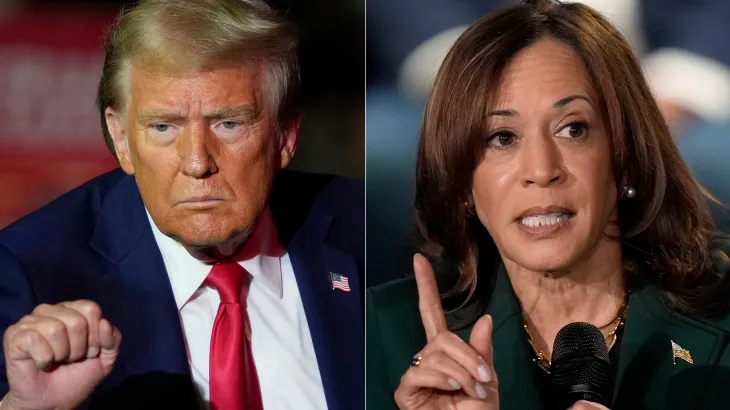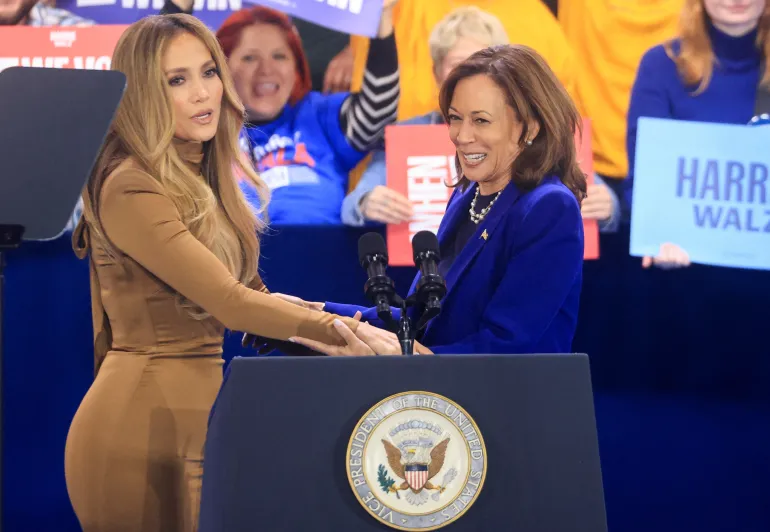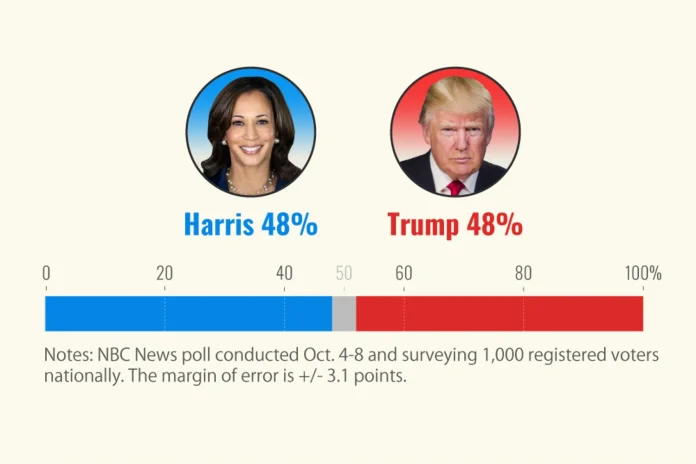The U.S. election is heading into its final days, with Vice President Kamala Harris and former President Donald Trump making their last efforts to win over key voters.
The race is tight, with polling showing each candidate’s strengths and weaknesses among various voter demographics. Both campaigns are focused intensely on Michigan, Pennsylvania, North Carolina, and Georgia, among other states, as these regions have large populations of voters that can swing the U.S. election outcome. Each candidate is working to connect with these communities in unique ways, promising targeted policies that address pressing concerns on taxes, foreign policy, and domestic welfare.
Vice President Kamala Harris’s tax strategy aims to balance between maintaining some benefits introduced by the Trump administration and introducing her own tax reforms. Harris plans to extend the Trump-era tax cuts for households earning under $400,000 when they expire in 2025, helping to sustain middle-income tax relief. At the same time, she proposes increasing tax rates on households earning over $400,000 to help fund new social programs. These proposals, she argues, are designed to address income inequality while supporting lower and middle-income families after the U.S. election.
Harris also aims to support families by expanding the Child Tax Credit to $3,600 per child annually and providing a $6,000 bonus for newborns. For first-time homebuyers, she has proposed a $25,000 credit, which she argues will help more Americans achieve homeownership. Additionally during U.S. Election campaigns, Harris is advocating for the elimination of taxes on tips, hoping to provide financial relief for service industry workers who often rely on gratuities as a substantial part of their income.
Former President Donald Trump has taken a different approach, campaigning on preserving all of the 2017 tax cuts, asserting that these policies fueled economic growth before the COVID-19 pandemic. He has pledged to eliminate taxes on tips, overtime, and Social Security benefits, focusing on appealing to workers who are affected by these tax obligations. Trump’s strategy is to appeal to working-class voters who benefited from his previous tax cuts and to those who feel overburdened by taxes on their labor income.

Trump has also made direct appeals to Michigan’s Arab American and Muslim communities, crucial voter blocs that helped President Joe Biden secure a victory in Michigan in the 2020 U.S. election. During a recent campaign stop at a halal restaurant in Dearborn, Michigan, Trump addressed Middle Eastern conflicts, pledging to end U.S. involvement in the wars affecting many of these voters’ home countries. Trump’s message resonated with Arab American voters in Michigan, where many residents have connections to families and communities affected by violence in Gaza and Lebanon.
With ongoing U.S. support for Israel in conflicts with Gaza and Lebanon, Harris is navigating a complex situation in Michigan. Many Arab American and Muslim voters who previously backed the Biden-Harris ticket are dissatisfied with the administration’s support for Israel in these conflicts. Many Michigan residents report losing relatives or seeing friends displaced by violence in Gaza and Lebanon, a sentiment that has amplified frustration with Harris and the administration’s foreign policy stance.
The Democratic campaign has tried to maintain support among these communities through closed-door meetings with Arab American and Muslim leaders, though this has not fully assuaged concerns. Harris’s focus has shifted toward appealing to Black voters in Michigan, aiming to strengthen her base with events in Detroit and East Lansing.
Trump’s strategy to win Michigan is bolstered by endorsements from local leaders, including Hamtramck’s Yemeni-born mayor, Amer Ghalib. Ghalib announced his endorsement for Trump following multiple discussions with the former president, despite acknowledging that he and Trump don’t align on all issues. Ghalib stressed that Trump’s team has been responsive to concerns raised by Michigan’s Arab American communities, leading Ghalib to view Trump as a potential ally for these groups. This endorsement highlights a notable shift in Michigan, where Arab American and Muslim communities were critical in Biden’s 2020 U.S. election win.
At a rally, Trump condemned statements he made earlier labeling Yemeni immigrants as “terrorists,” following criticism from Arab American leaders. Ghalib, who discussed the issue directly with the Trump campaign, appreciated that Trump refrained from making similar comments afterward. He believes that Trump is now an ally for his community, one that may advocate for their interests if elected.
In contrast to Trump’s outreach to Michigan’s Arab American voters, Harris has focused heavily on African American communities. On the final Sunday before Election Day, Harris started her campaign day in a Detroit Black church and continued with visits to community hubs like restaurants and barbershops in Pontiac. Her focus on Michigan State University in East Lansing underscores her efforts to connect with younger voters, especially those in college towns that traditionally lean Democratic. In East Lansing, Harris hopes to rally young and first-time voters, energizing a demographic that could play a key role in Michigan’s outcome for the U.S. election.

Recent polling reflects how close this U.S. election is. A poll from The New York Times and Siena College indicates Harris holds slight leads in Nevada, North Carolina, and Wisconsin, while Trump leads in Arizona. Michigan, Georgia, and Pennsylvania are essentially tied between the two candidates, intensifying the focus on these states. Michigan, in particular, has a history of tight races, with Biden winning by 155,000 votes in 2020, a significant swing from Trump’s 11,000-vote win in 2016.
Pennsylvania is also shaping up to be a crucial battleground, with Trump closing a previously significant gap in the polls, now tying with Harris in recent data. Trump’s final push in Pennsylvania included a rally in Lititz, where he reiterated his criticisms of the U.S. election process and cast himself as the only candidate willing to confront these issues head-on.
Polling shows that Harris maintains an edge among women voters, while Trump is gaining ground with Hispanic voters, especially men. The U.S. election is also seeing high voter turnout, with over 76 million Americans already casting ballots, approaching half of the total votes cast in the 2020 U.S. election. Harris currently leads among early voters, with an eight-point edge over Trump, but Trump leads among voters who plan to vote on Election Day, suggesting that final turnout could be pivotal.
On Saturday, Richard Grenell, Trump’s former acting director of national intelligence, spoke to Bangladeshi voters in Hamtramck, encouraging them to consider their influence in the U.S. election by casting ballots for Trump. Grenell emphasized that if Bangladeshi Americans swing Hamtramck’s vote, it could reshape the attention future candidates give to their community. He highlighted the potential long-term influence they could gain in national politics.
In addition, Trump’s appeal to Michigan’s Arab American communities marks an effort to build what his team refers to as a “new coalition.” This coalition brings together diverse ethnic and religious communities who feel their concerns have not been adequately addressed by the current administration. Trump’s messages on ending U.S. military involvement in the Middle East and addressing concerns about immigration policies have resonated with some of these communities.
Amid the final stretch of her campaign, Harris made an unannounced appearance on “Saturday Night Live” in New York, sharing the stage with Maya Rudolph, who frequently impersonates her. The two dressed identically in black suits and pearls, trading playful variations of Harris’s name, portraying her as a calming figure in contrast to the political drama dominating the U.S. election season. This moment of levity aimed to appeal to undecided and disengaged voters who may see Harris as a stabilizing presence.
In the final days before Election Day, both candidates are crisscrossing key battleground states. Harris is focusing her efforts on Detroit and East Lansing, recognizing Michigan as a must-win state. Trump, meanwhile, is set to make stops in Pennsylvania, North Carolina, and Georgia, states where the margin of victory could decide the U.S. election. Both campaigns are relying on a mix of last-minute rallies, community outreach, and endorsements to secure undecided voters and motivate likely supporters to turn out.
The candidates’ contrasting approaches to foreign policy and domestic issues continue to shape the U.S. election discourse. Harris’s support for Israel amid Middle Eastern conflicts has led to criticism from some progressive and Arab American voters, who feel alienated by the administration’s stance. Trump has seized on these sentiments, framing himself as the candidate who would end U.S. involvement in overseas conflicts, positioning himself as an alternative for voters affected by these issues.
Domestically, tax policies remain a defining issue. Harris’s plans to extend certain Trump-era tax cuts for middle-income Americans while increasing taxes on high earners aim to appeal to working families. Trump’s proposal to maintain the 2017 tax cuts and eliminate taxes on tips and overtime is targeted at appealing to the working class, suggesting his policies would help fuel economic growth and reduce the tax burden on labor income.

With the final votes set to be cast, this U.S. election represents a defining moment in American politics. Polling shows both candidates viewed unfavourably by a significant portion of the electorate, yet millions have already voted, reflecting the high stakes felt by voters nationwide. The next president will have a considerable mandate to address pressing issues at home and abroad, from economic challenges and tax reform to foreign policy decisions impacting communities with global ties.




